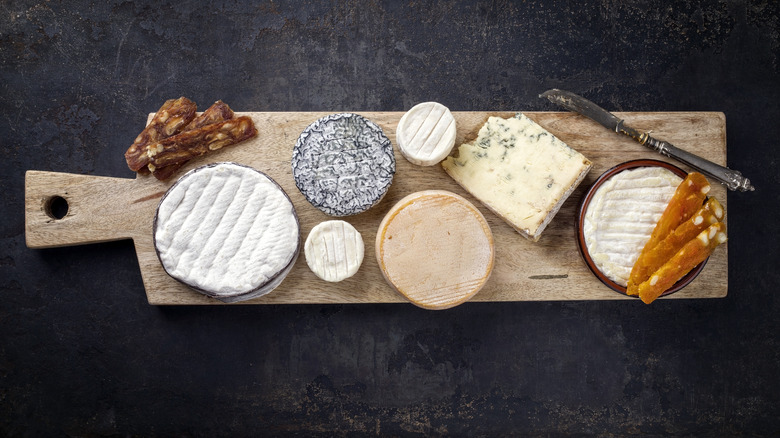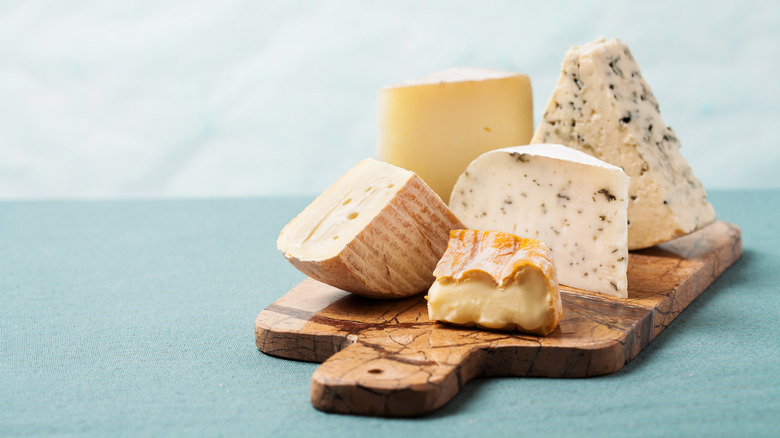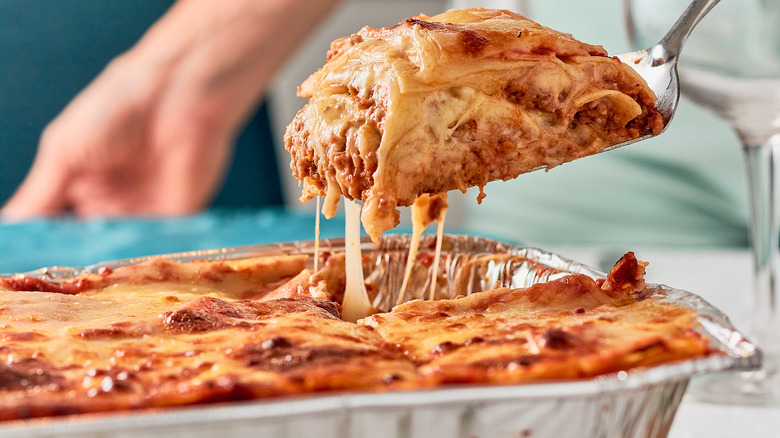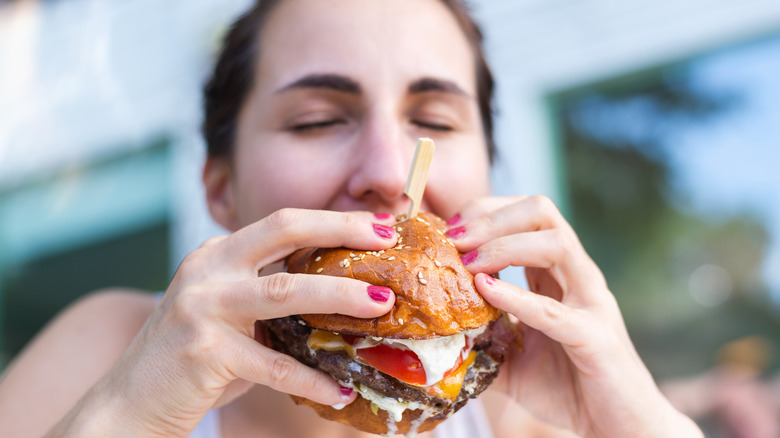What Happens To Your Body When You Eat Cheese Every Day
If you love cheese, you're not alone. In fact, between 1977 and 2017, Americans increased the amount of cheese they individually consumed from about 16 pounds to about 37 pounds per year, according to USDA data (via Mashable). That's up some 21 pounds per person — a whole lot of cheese!
"Cheese consumption has been growing over time," Jerry Cessna, a USDA agricultural economist, who tracks dairy trends, told Mashable. "There have been some ups and downs, but mostly ups. It's grown tremendously if you look at the long-term."
While we'd love to say that there's no such thing as too much cheese, there kinda, sorta is. While the research shows that our taste in cheese has become more sophisticated over time (i.e., we're eating a whole lot less processed cheeses in favor of artisanal varieties), it's still alarming (via Mashable). After all, cheese has addictive qualities, according to Healthline, and it can take a toll on your health. Here are some of the biggest ways eating cheese every day affects your body — the good, the bad, and the ugly.
Cheese and other dairy products are good for your bones
You may have heard this when you were a kid: Dairy is good for your bone health. And, guess what? Cheese is dairy! What a happy coincidence for cheese lovers. A study published in the British Journal of Nutrition suggests that consuming dairy products like cheese can help to reduce the risk of "low-trauma" bone fractures. "Dairy foods, namely, milk, cheese and yogurt, are the principal sources of dietary Ca [calcium] in developed countries, with an adequate consumption synonymous with optimal bone health," wrote the study's authors.
In fact, the average calcium intake is about 950 milligrams per day among Americans aged two to 18 years. Of that, 32% to 51% comes from milk and cheese, according to a study published in the journal, Nutrients. That's why the researchers call it a "principal dietary source." Just remember another truth you probably heard while growing up: Everything in moderation!
Eating cheese can benefit your teeth
We get it: Cheese pizza. Cheesy garlic bread. Cheese fondue. Cheese fries. Cheese quesadillas. All the cheesy things. You love it, we love it. And, while many foods that taste delicious are not exactly your dentist's favorites, cheese is actually said to have some dental health benefits. That's right: Eating cheese can give you the confidence to cheese more and show off those pearly whites (ba-dum-tss).
According to the University of Rochester Medical Center, cheese is a "saliva maker" (via Shine Smile). "The calcium in cheese, and the calcium and phosphates in milk and other dairy products, help put back minerals your teeth might have lost due to other foods."
The calcium in cheese is also handy in rebuilding tooth enamel. A 2015 Danish study published in Karger found that more children with an above-average intake of dairy were much more likely to be cavity-free after three years compared to those with a below-average dairy intake.
Cheese may just give you a mood boost
Cheese tastes good, and it feels good to eat cheese. In fact, cheese can be addicting for many people. When you eat it, your body is slow to digest the protein casein, which breaks down into casomorphins (via Healthline). Casomorphins can actually attach to dopamine receptors in your brain, also known as the feel-good hormones that trigger feelings of pleasure and reward, according to research published in Food and Nutrition Research.
Additionally, the vitamin B12 in cheese is essential, since your body doesn't produce it on its own. This vitamin is responsible for your energy and mood regulation (as its necessary for the production of serotonin, the other happy hormone), too, according to Healthline. Research has even shown that the body can better absorb the vitamin from dairy products than from beef and fish (via Healthline). Just one large slice of Swiss cheese (21.9 grams), for example, can give you about 28% of the Daily Value of vitamin B12, according to the U.S. Department of Agriculture.
The sodium in cheese can be bad for your health
Cheese may taste especially good because it is chock full of sodium. And while that certainly adds flavor, it can take a serious toll on your health. According to the Dietary Guidelines for Americans, diets that are high in sodium — which may involve a lot of cheese, for example — are linked to an increased risk of developing high blood pressure (via U.S. Food and Drug Administration). And high blood pressure is a major cause of heart disease and strokes.
More than 70% of dietary sodium comes from prepared and packaged foods, including processed cheese — not from the table salt that you may sprinkle on your food when you're cooking or eating. While eating cheese, as we now know, has some health benefits, you should always be careful about how much of anything you are eating. Too much of one thing can be a bad thing, after all.
Too much dairy is associated with certain cancers
Eating too much dairy products, like your favorite cheese, is associated with certain types of cancers, according to a study published in Novartis Foundation Symposia. "A Western lifestyle — characterized by low physical activity, and high dietary intake, animal protein, saturated fats, and rapidly digestible carbohydrates — is associated with increased risks of many cancers," according to the researchers.
Other research out of the Loma Linda University School of Public Health in Southern California, which was published in the International Journal of Epidemiology, found that dairy products like milk may have an association with breast cancer — though the researchers weren't able to make the same connection to cheese. That said, a study published in Current Developments in Nutrition did find that "higher intakes of American, cheddar, and cream cheeses were associated with a marginally significant increased risk" of breast cancer.
In 2019, the nonprofit Physicians Committee for Responsible Medicine petitioned the Food and Drug Administration to require cheese manufacturers to display a warning on all dairy cheese products for this reason: "Dairy cheese contains reproductive hormones that may increase breast cancer mortality risk." The committee later filed a lawsuit against the FDA for its failure to respond.
Cheese may cause some digestive issues
It may not come as a surprise that cheese can be at the root of any digestive issues you may have. After all, have you ever been confronted with a charcuterie board that only ended in, uh, frequent trips to the bathroom? It's because too much dairy can make your stomach hurt. According to the U.S. National Library of Medicine, lactose intolerance is a lot more common than you might think. In fact, about 65% of the whole world's population has a reduced ability to digest lactose post-infancy.
Lactose intolerance is defined as "an impaired ability to digest lactose, a sugar found in milk and other dairy products." Lactose is typically broken down by an enzyme called lactase, which is created by the cells in the lining of your small intestine. But if you are lactose intolerant, your body will have trouble breaking down lactose. This may result in bloating, abdominal pain, gas, nausea, and diarrhea within a half-hour to two hours of eating cheese and other products containing lactose.
Cheese might give you weird dreams
Have you ever eaten a bunch of late-night junk food — like, you know, cheese — and had weird dreams afterward? There's a chance that your nighttime cheese-binging habits and unusual dreams are linked, according to the British Cheese Board research.
The British Cheese Board asked 200 volunteers to participate in a week-long study. Of them, 72% slept great, 67% remembered their dreams, and none of them recorded any nightmares (a common myth) after eating 20 grams of cheese one half-hour before hitting the hay. In fact, the researchers believe that, due to one of the amino acids (tryptophan), eating cheese before bed could actually help you get a good night's rest. However, they also found that participants had different kinds of dreams — not nightmares, just strange dreams — depending on the type they'd consumed.
Specifically, 65% of those who ate cheddar dreamed about celebrities, and over 65% of those who ate Red Leicester dreamed about schooldays. Plus, 85% of the women who ate Stilton experienced "the most unusual" dreams. All of the men who ate British brie had "cryptic" dreams, and two-thirds of all the participants who ate Lancashire had dreams about work.
Will eating cheese cause you to gain weight?
Okay, this one probably won't shock you: Cheese may be linked to weight gain. All those cheeseburgers, cheesy fries, mozzarella sticks, grilled cheeses, and everything else you douse in cheese can put some weight on you — though only if you eat too much of it.
According to LiveStrong, cheese is dense in calories. So small amounts of it can still be high in calories. For example, a single slice of cheddar cheese (1 ounce) packs 115 calories. The U.S. Department of Agriculture recommends that you limit your consumption of hard cheeses to just 1.5 ounces per day.
Dariush Mozaffarian, the lead author of a 2011 paper published in the New England Journal of Medicine and dean of the Tufts Friedman School of Nutrition Science and Policy, told Wired that cheese isn't really as bad for you as you might expect. "There's almost no evidence that cheese causes weight gain — and in fact, there's evidence that it's neutral at worst," he said. Of course, it doesn't hurt to be mindful of your overall calorie intake.
Cheese may be at the root of bad breath
While cheese can certainly be beneficial to your dental health because its calcium makes your teeth stronger as well as balance the pH level in your mouth, according to Millar Dental Care, it might just be at the root of bad breath. According to a 2013 study published in Human Physiology, "the intensity of bad breath differs during the day" and can be "due to eating certain foods (such as garlic, onions, meat, fish, and cheese)."
"Imagine millions of bacteria feasting on particles of food and tissue in our mouth, some giving off smelly waste," David Krol, former chair of the American Academy of Pediatrics Section on Oral Health, told Men's Health. The microbes get to work digesting milk solids and, in doing so, they can create excess hydrogen sulfide — which smells like rotting eggs in some people's humble opinions.
Cheese provides you with important nutrients
DId you know that cheese is full of nutrients? While most of us probably don't need an excuse to eat more cheese, your reason could be that it's totally nutritious! According to the Dairy Council of California, there are more than 2,000 varieties of soft and hard cheeses out there gracing the world with their presence. Think: mozzarella, brie, feta, cheddar, gouda, and so many more. They come in chunks, cubes, slices, shredded bits, sticks, spreads, and all sorts of delightful forms. And because they each come with some vital nutrients, like calcium, phosphorus, zinc, vitamin A, and vitamin B12, the Dairy Council confirmed that "cultured dairy products can contribute to a healthy eating pattern."
The nutrients in cheese are essential in building healthy bones and healing wounds, as well as critical to your skin and eye health and the production of red blood cells. In other words: Eat your cheese! Just don't overdo it, of course.
Is cheese harming your heart health?
Cheese has sort of been linked to cardiovascular health issues, according to Harvard Heart Letter— but probably not in the way that you think. What we mean is that researchers have not definitively found a direct association between dairy fat and a higher risk of cardiovascular disease, which encompasses nonfatal heart attacks, fatal heart disease, and strokes. What the research did find, however, is that replacing about 5% of your calories from dairy fat with a similar amount of unsaturated fat (such as fat found in vegetables and vegetable oil) has been linked to a 24% lower risk of cardiovascular disease.
In other words: Eating cheese is not necessarily bad for your heart health, but replacing your intake with healthier fats is certainly better for your heart health. So, the next time you go for that string cheese in the fridge, maybe reach for string beans instead.
Eating cheese daily could lead to fatty liver disease
Ever hear of fatty liver disease? True to its name, this condition means you have too much fat in your liver so your body has trouble removing the toxins and producing bile, which is the digestive protein, according to Healthline. Fatty liver disease takes a toll on the liver so it doesn't function as well as it should. And this can be difficult to deal with throughout day-to-day life, due to uncomfortable symptoms.
Unfortunately for cheese lovers, the dairy product has been linked to the disease, according to a 2017 study (via CBS News). "Saturated fats such as in butter, fatty cheeses and coconut oil are thus the worst thing to eat from the liver perspective," Dr. Hannele Yki-Jarvinen, professor of medicine at the University of Helsinki in Finland and co-author of an accompanying paper, explained. "If you change your diet to a more healthy one containing healthy fats, such as found in olive oil, your liver fat decreases in a few days," she continued. But cirrhosis, which is scarring of the liver due to liver diseases, is difficult to reverse.
Your daily cheese habit may be wreaking havoc on your skin
Having trouble with your skin? If you are breaking out often, one of the first things your dermatologist is likely to ask you about is your diet. As it happens, cheese could be the culprit, according to research published in the journal, Nutrients. Giving up dairy products could give your skin a much-needed break — if only for a period of time.
In fact, writer Christian Allaire penned a piece for Vogue, titled, "I Gave Up Dairy — and My Adult Acne Vanished in Under a Month." He wrote, "The solution to my lifelong skin struggles turned out to be surprisingly simple: cutting out dairy." Ditching the cheese, combined with his other "still-regimented skin-care routine of cleansing, exfoliating, moisturizing, and rosewater spritzing" helped his skin finally clear up. So much so that he says he was shocked that no doctor or dermatologist had ever "laid it out as an obvious, primary cause of acne" for him before.
However, this doesn't mean it'll work for everyone. As Healthline explained, some evidence supports the notion that dairy products may worsen acne or lead to breakouts, "but everyone's skin is different."
Cheese could help to prevent cognitive decline
When you graze from a cheese board, you probably don't think much about the cognitive benefits of what you're eating. Nevertheless, according to research out of Iowa State University, which was published in the November 2020 Journal of Alzheimer's Disease, eating cheese can help to slow cognitive decline.
On top of fighting against Alzheimer's Disease, cheese is a great mental pick-me-up. "I was pleasantly surprised that our results suggest that responsibly eating cheese and drinking red wine daily are not just good for helping us cope with our current Covid-19 pandemic, but perhaps also dealing with an increasingly complex world that never seems to slow down," Auriel Willette, assistant professor in Food Science and Human Nutrition at Iowa State University, revealed (via Independent).
"Depending on the genetic factors you carry, some individuals seem to be more protected from the effects of Alzheimer's, while other seem to be at greater risk," Brandon Klinedinst, a Neuroscience PhD candidate in the Food Science and Human Nutrition department at Iowa State, also explained. "That said, I believe the right food choices can prevent the disease and cognitive decline altogether" (via ScienceDaily).















